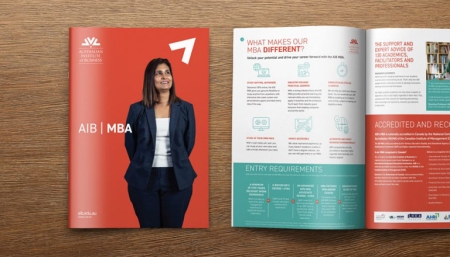The significance of burnout – are you paying attention?

Workplace burnout has always been a prevalent issue, but it has become more pronounced since the COVID-19 pandemic. A report by McKinsey & Company reported that from a global survey of over 15,000 employees and 1,000 HR decision makers across 15 countries, a significant and persistent gap between how employees perceive mental health and well-being to how employers do. The results highlighted a staggering 22% gap with employers constantly rating dimensions associated with mental health and workplace well-being more favourably than employees. There is a significant misalignment, and more needs to be done.
On the 15th of November, we had the incredible opportunity to hear from Theone Conradie, General Manager & Lead Consultant at People Capital Consultants, and AIB MBA alumna who shared her inspiring keynote on the topic of burnout.
About Theone Conradie:
Theone is a Professional Certified Coach with 30+ year experience across diverse sectors like Mining, Manufacturing, Engineering, Financial Services, Education, and Local Government. Her extensive background includes collaborating with multinational brands like Cadbury Schweppes, General Motors, Ernst and Young, BHP, and Rio Tinto. And if that wasn’t enough, Theone also delivered a presentation at the TEDx UWA Parallels in October last year, titled “The Resilience Gap: Discovering the hero within“.
The impact of burnout
Theone started by asking the audience to close their eyes and raise their hands if they agreed with either of the following two statements:
“How many of you have felt the pressure as we approach the end of the holiday season? Or, as leaders, have you noticed a spike in the stress levels amongst your team?”
As a business coach, Theone has come across many professionals who agree with both of these statements, and she reassured us that we are not alone in feeling this way.
‘The festive season is supposed to be a time that brings increased joy, but for many, it creates a lot of stress and challenges. And dare I say it, feelings of burnout, especially for our leaders.
I had some wonderful conversations with people before I got up here tonight. And I really want you to walk away this evening understanding a little about why we are seeing stress levels increase to the extent that they are and what you can do about it.”
Theone explained that whilst the festive season should be filled with family, joy and connection, increasingly she finds it is a trigger of stress for many.
“As an executive coach in large organisations, I’ve noticed a growing trend among my clients: they frequently discuss stress. This stress stems from various sources, such as ongoing organisational changes, financial pressures from rising living costs, and personal issues. They struggle to balance family time and are overwhelmed by a seemingly endless stream of negative global news.”
Theone then highlighted data from the latest Microsoft Work Trend Index conducted in 2022 showing that 66% of leaders in Australia experience burnout, surpassing the global average of 53%.
“Imagine the impact when 66% of our managers and leaders feel burnt out. This leads to cynicism, sarcasm, detachment, exhaustion, and a loss of confidence in one’s role. While not everyone may experience these symptoms, if you start recognising them in yourself or your colleagues, it’s crucial to pay attention.”
Unpacking the end-of-year increase in burnout
Theone noted that burnout commonly peaks at year’s end due to the pressure of completing numerous tasks before the year concludes, placing significant strain on both individuals and teams.
End-of-year performance reviews
We put pressure on ourselves to meet our targets and for our teams to also do so.
“I have also seen an increase over the years in end-of-year engagement surveys, and we often feel we are on the chopping block if we don’t meet these expectations and perform well on these surveys.”
Not everyone feels connected during the festive season
While many people have family and friends to celebrate the festive season with, Theone pointed out that others may not, which can lead to feelings of isolation.
“Not everybody has a family to spend time with. Some people feel like they are outsiders. They don’t feel like they have a place to go, and Christmas just heightens that sense of being excluded.”
We are switched on 24/7
We have a constant barrage of information from email and online chat streams.
“Our digital debt is increasing. We never have the time to switch off. The lines between our professional and personal lives have blurred, and there is little time to step back and disconnect.”
The power of our brains
At this point, Theone did reassure us that the news wasn’t all bad and that thankfully, we are able to develop our resilience by being intentional in our reflection.
“Our brains are one of the most incredible, but also laziest organs of the body. Unless I really spell out how bad this crisis actually is, I won’t get your brains attention…. your brain will do nothing – it will ignore and override and file this information in the interesting but not important folder.”
In her ongoing doctoral research, Theone has interviewed 24 executives to gain insights into why some thrive while others do not.
In the work environment today, post-pandemic, with change as a constant, my research has shown that leaders are finding they appear to be in continuous crisis mode, with competing demands and increased stress – a state of continuous crisis rather than one off events. Where before you may have felt like you have to escape to the bunker to shelter from the bombs, the sense was this was for a finite time and you could come out and breathe easy for a while. However, what we are seeing now is that the time in the bunker is indefinite and the brain does not know how to process this so it shifts to ignoring and overriding rather than adapting to the circumstance at hand.
How do we get the brain to stop and note what’s happening?
Theone explained that ignoring our brain’s need to take a break during times of stress or ‘ignore and override’ is actually what she refers to as grit.
“There are a lot of organisations who are starting to introduce resilience training, and much of this training focuses on this concept of grit. Grit is an important element of resilience, but it is only one element. Resilience is so much more than Grit.
What can we do? Being intentional & tapping into resilience
Building your resilience muscle, like anything else, requires practice and commitment and discipline. But it is easier than you think.
It requires you first to be intentional in your reflection
“What is going to sustain you is being able to be intentional, to be able to stop and check-in to be able to just slow things down for a minute.”
Theone took a moment to acknowledge that slowing down is quite often easier said than done and that in times of stressful meetings or working with people constantly on edge, it is incredibly difficult to step back and have a moment.
“I want to emphasise that resilience is born from adversity; it can’t be taught. However, you can develop resilience by reflecting on your own challenging experiences, considering your journey and the adversities you’ve overcome to get where you are today.”
Theone acknowledged that whilst some of us have experienced more adverse events than others, this is relative and the nature of being human means that there is something that we can all tap into to learn from. She encouraged us to follow the following 3 steps:
1. Step back and reflect intentionally and ask ourselves the following questions:
- Where have I come from, and how did I get to where I am?
- What did I go through to get here?
- What can I learn from those lessons?
- What is the resilience gap that I have?
- What can I do differently?
2. Be aware of our triggers in the moment and BREATHE
Theone explained that when we intentionally take time to reflect, an interesting shift occurs: we become more aware and attuned to our triggers.
“Pay attention to your triggers. When you begin to notice your stress triggers, you can also begin to regulate your emotions, in the moment. You can move from reflecting at the end of a day to becoming aware in the moment and through slowing your breathing and looking away for a minute allowing your brain to revert back to a safe space in your mind, in a matter of seconds, shifting from amygdala response (emotional) to prefrontal cortex response (cognitive) and in so doing self-regulating giving you the necessary time to respond in a cognitive, rational manner.”
3. Focus on your purpose and future
Theone then asked us to remember the childhood classic Alice in Wonderland.
“Alice, wandering and lost in the forest, asked the Cheshire Cat which way she should go. He inquired, ‘Where do you want to end up?’ But when she replied that she didn’t know, the cat said, ‘Then it doesn’t really matter which way you go, does it?”
“Make it matter where you end up. Having a vision for your future and a sense of purpose becomes an important anchor during adversity.”
4. Resilience requires connection
“Interacting with others triggers the release of oxytocin and serotonin. Consider your experiences, even positive ones at work that come with learning and added responsibilities; they elevate cortisol levels. Since your brain doesn’t differentiate between positive and negative stress, balancing it with oxytocin and serotonin is essential.”
Theone pointed out that even a networking event, like the one we were attending, offers a chance to achieve this balance. Although these events can be awkward and stressful for many, by shifting our perspective, we can transform them from high-stress situations into positive experiences.
“What if we showed up being curious? What if we showed up rather than looking at what we can get from others, but rather how can I help others in this room? What is it that I have in my toolkit that I can give you?”
“Attend networking events with the goal of genuinely connecting and actively listening to others. Focus less on yourself. Focus more on asking questions about them to see what you have to offer them. This shift in approach can change everything.”
In finishing, Theone recommended concluded with a quote from Viktor Frank’s ‘Man’s Search for Meaning’ by Viktor Frankl’.
“Between the stimulus and response, there is a space. And in that space lies our freedom and power to choose our responses. In our response lies our growth and our freedom” (Frankl, 1946).
The increased stress during the festive season and post-pandemic challenges are real, but so is our capacity for resilience. Remember, resilience is not about avoiding stress; it’s about navigating stress in a healthy way. By being intentional in our reflection, prioritizing self-care by recognising our triggers and staying centred and grounded in our purpose and by building a supportive network, we can prevent chronic stress and burnout not just during the holidays but throughout the year. Take the time to think about your response to the stimulus your brain faces daily… reflect intentionally and choose your response…. Over this you have the control and in this lies your growth and freedom. We owe this to ourselves. Wishing you all a resilient and joyful festive season!





